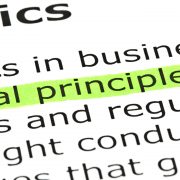Today, we have a poor understanding of the fundamental role of entrepreneurs in advancing economic growth. This misunderstanding holds us back; we could create more prosperity for everyone if we corrected it.
There are two important causes we can point to as sources of error. First, we all have an imprecise definition of entrepreneurial activity. Second, the way we measure economic growth does not properly recognize the role of entrepreneurs.
The definition of entrepreneurial activity.
In fact, one group of economists, the so-called Austrian School, has always understood the role of entrepreneurs in the economy better than anyone else. In Human Action, published in 1949, Ludwig Von Mises laid down the principle of economic growth:
The direction of all economic affairs is in the market society a task of the entrepreneurs. Theirs is the control of production. They are at the helm and steer the ship.
What exactly do entrepreneurs do to steer the economic ship? The founder of the Austrian School, Carl Menger, had defined this very precisely in his 1871 book, Principles Of Economics. (We’ve known this stuff for a long time.)
Menger defined the structure of production, and the role of entrepreneurs within that structure. He used some language that we don’t still use today, but it’s actually very helpful to us in forming a picture of how the economy works. Let’s tackle it.
Menger divided the goods and services that are produced in the economy into goods and services of what he called the first order – those that are the final output of a production process and are consumed – and goods of higher order – those that are capital goods and producer services that constitute the supply chain links prior to final consumption. The process of transforming goods of higher order into goods of lower or first order is planned and executed by entrepreneurs. This is the definition of entrepreneurial activity. Not only does the entrepreneur participate in this process, he or she makes the underlying economic calculations and the actual decisions to assign goods of higher order to particular productive processes. Today, we are more likely to use language like the allocation of scarce resources and the trade-offs between alternative uses of capital.
The Role Of The Entrepreneur.
Menger was very specific about exactly what entrepreneurs do in the entrepreneurial process:
- Gather or create information. From the perspective of today’s information economy, this might seem trivial. But, in fact, Menger was ahead of his time in understanding that successful entrepreneurs create new information, or more comprehensive information or new insights from existing information (what today we’d call analytics). It is the quality and uniqueness of information that is the first ingredient of entrepreneurial initiative. Today we talk of addressable markets and unmet needs and available opportunities; these are aspects of information, and modern entrepreneurs all follow Menger’s first principle.
- Economic calculation. Time is required to transform the higher order goods and services into lower goods and services; capital is going to be tied up (Menger called this securing “the services of capital”), and the entrepreneur may forego a salary and use up savings and investment. He or she makes an economic calculation of the value of the revenues to be realized from selling the future goods and services and compares it to the cost of the entrepreneurial activity to get to the point where net revenues begin. This ROI model or revenue model or business model calculation is rife with uncertainty, since nothing in the future can be predicted with precision. This is the essence of the risk the entrepreneur takes in pursuit of future return.
- An act of will. Here’s another use of 19th century language that sounds a bit old fashioned to our modern ears. Menger referred to the act of will “by which goods of higher order are assigned to any particular production process”. Today, we might refer to this act of will as entrepreneurial judgment. It’s what we admire entrepreneurs for, and it’s what makes them heroes. They make the quantitative economic calculation in their spreadsheets and business models. But then they must take the leap of faith that says they believe in the model and are prepared to risk the capital, sacrifice their own income in the short term, and pin their reputation on the model being successful. They take the responsibility for making these decisions.
- Supervision of the execution. Menger recognized that the entrepreneur could be the venture capitalist, or the technical founder, or the CEO, or play some other role in execution. But to qualify as an entrepreneur, there must be an element of supervision, taking the responsibility for implementing the plan effectively and efficiency. In today’s terms, we might see the entrepreneur hiring and managing, and sometimes changing, vendors; securing and supervising the allocation of investment capital; making mid-term adjustments (sometimes called pivoting); and responding to market feedback. All of this and more would fall under Menger’s definition of supervision.
In summary, Menger said, the value of all the higher order goods and services in the economy, necessary for the production of lower order or first order goods and services, is equal to the prospective value of those future goods and services. That’s the economic calculation. When we compute that value, we must include the value of the services of the entrepreneurs themselves (what we’d call today their value-added) and the time value of the period for which they take command of capital in order to deploy it to their entrepreneurial purpose (roughly, the discount rate or interest rate or cost of capital).
Can We Measure The Contribution Of The Entrepreneur?
Why don’t we fully recognize this economic contribution of the entrepreneur today? It’s because we don’t measure it properly. That’s the difference between Gross Domestic Product (GDP) and Gross Output (GO) – the subject of a future post at Center For Individualism.













